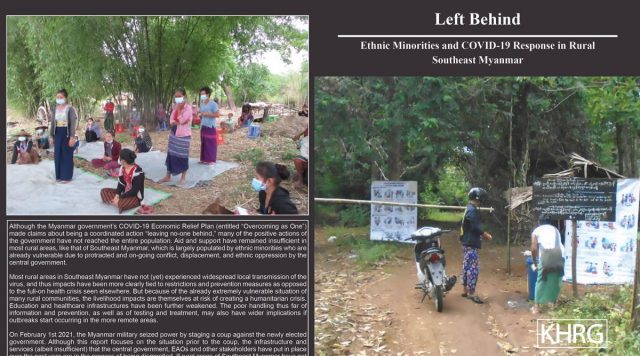Left Behind: Ethnic Minorities and COVID-19 Response in Rural Southeast Myanmar (Press Release)


Karen Human Rights Group (KHRG) is pleased to announce the release of its latest report, Left Behind: Ethnic Minorities and COVID-19 Response in Rural Southeast Myanmar. The report presents the experiences of ethnic minorities in Southeast Myanmar regarding the COVID-19 pandemic. It investigates the Myanmar government’s response to the pandemic to show how support and aid failed to reach many rural areas in Southeast Myanmar.
Although the Myanmar government’s COVID-19 Economic Relief Plan made claims about being a coordinated action “leaving no-one behind”, many of the positive actions of the government have not reached the entire population. Aid and support have remained insufficient in most rural areas of Southeast Myanmar, further contributing to the vulnerable situation of ethnic minorities who have long faced protracted and on-going conflict, displacement, and ethnic oppression by the central government. Because the February 1st coup has dismantled the nation’s already insufficient COVID-19 response infrastructure, there is now even greater necessity for creative solutions to address both the immediate and long-term needs of ethnic minority communities.
Villagers in rural Southeast Myanmar have been facing economic hardships and food insecurity, as a result of the COVID-19 pandemic. The government’s implementation of its COVID-19 Economic Relief Plan has largely left out villagers living under Karen National Union (KNU) administration and many mixed control areas. As such, the KNU as well as civil society organizations (CSO) / community-based organizations (CBO) operating in these areas, have been left on their own to figure out solutions to support these communities.
Despite KNU efforts to fill the void by providing villagers with COVID-19 prevention materials and food items, their support remains limited given that they have not been able to benefit from the large sums of international funding that have been provided to the Myanmar government to address the pandemic. Similarly, CSOs/CBOs and other international aid organizations have often found their work blocked over issues of authorization at the local and national levels.
Also explored in this report are the impacts of the pandemic on villagers’ access to healthcare and education, and the necessity for greater support for ethnic service providers who have been the primary actors who have managed to maintain some services and support for villagers in need. They will also be critical actors in addressing the potential humanitarian crisis that has been unfolding since the coup.
KHRG hopes that this report will allow national and international stakeholders to gain a better understanding of the impact COVID-19 has had on ethnic minorities in Southeast Myanmar. It includes a number of recommendations on how national and international stakeholders can develop more inclusive support schemes that ensure the protection and well-being of rural villagers.
Media Contacts:
Saw Nanda Hsue: +66 (0) 811 297 564
Naw Htoo Htoo: +66 (0)87 205 1856

